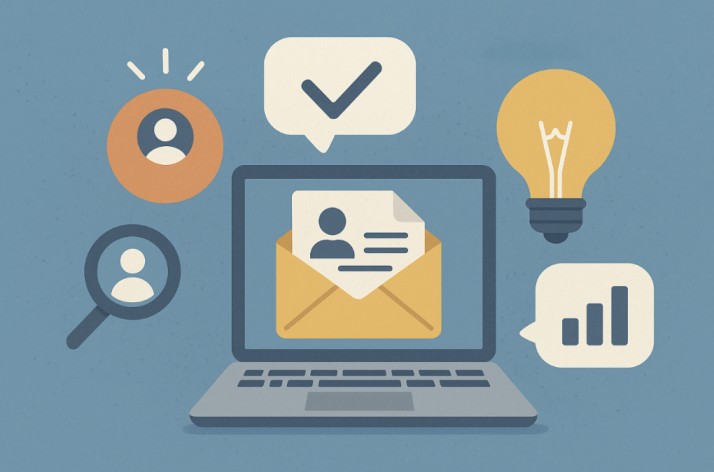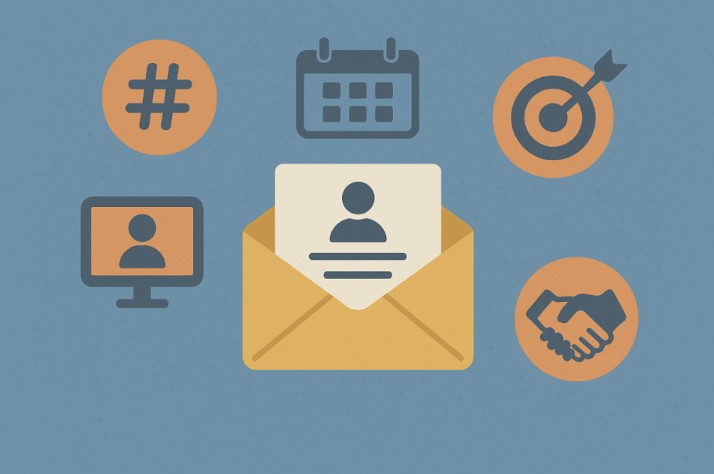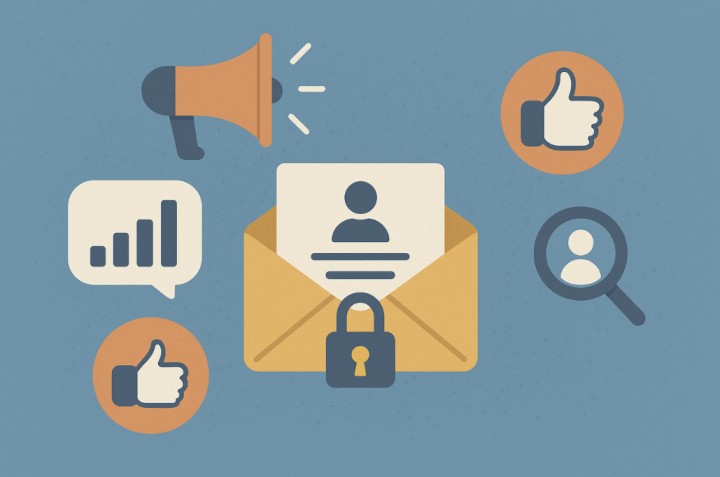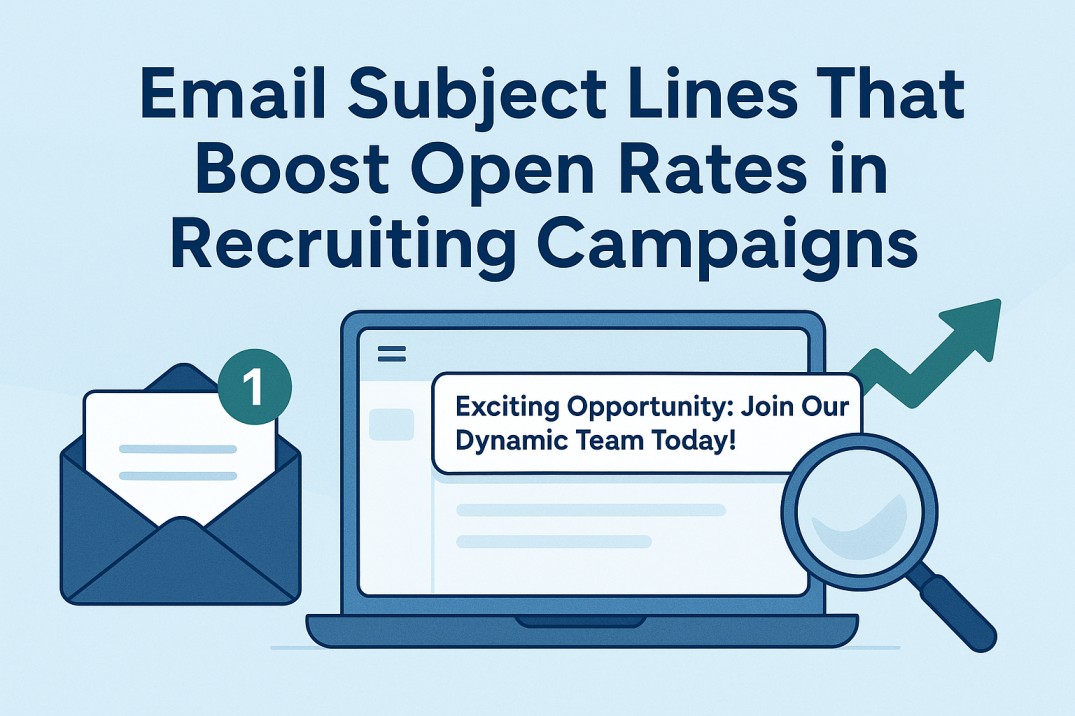Email Subject Lines That Boost Open Rates in Recruiting Campaigns
Email continues to be one of the leading channels for recruiting communication. However, engaging candidates to get them to actually open your emails can be quite a challenge. With overflowing inboxes, your email subject line is often the deciding factor on whether your candidates even see your message or ignore it completely.
Studies show 64% of recipients decide to open emails based on the subject line alone, according to OptinMonster.
This article will guide you through influential ways to write subject lines to increase open rates in recruiting campaigns. We will discuss types of emails, provide examples from real world campaigns, and highlight mistakes you want to avoid.

What are Email Subject Lines?
The subject line of the email is the first textual element the recipient sees, when it shows up in their email inbox preview. It is a concise summary of the contents of the email.
An effective subject line is attention grabbing, engages curiosity, and provides value to the receiver. Subject lines have a significant impact on opens and subsequent engagement.
Consider the subject line as a first impression, it can make or break your entire email campaign.
Why are Recruitment Email Subject Lines Important?
Recruiters utilize recruitment emails to source talent pool, to generate leads, and to reactivate passive candidates. However, if the candidate doesn't open the email, your hard work is gone.
The importance of subject lines in recruitment emails cannot be overstated:
- First impression: The subject line is the first thing the potential candidates will see.
- Open rates: A powerful subject line can help the candidate notice the message.
- Expectations: The subject line will inform the recipient of what they can expect to read.
- Avoid getting lumped into spam or irrelevant emails: A strong subject line can help the reader separate your email from the clutter.
Emails with personalized subject lines are 26% more likely to be opened (Campaign Monitor, 2023)
Best Email Subject Lines That Boost Open Rates
The format for the subject line proves critical to the success of your recruiting email. Let's review the best types by campaign intention.
Welcome Email Subject Lines
Welcome emails, as the name suggests, are the first touchpoint with potential candidates or new subscribers. The goal is to make an introduction and get them excited about the opportunity.
Examples:
- "Welcome to [Company Name], [First Name]—let's build your career together!"
- "Greetings from [Company Name]—we're eager to connect!"
- "Thank you for joining [Company Name] Talent Network!"
- "Let's get started, [First Name]—your journey starts here!"
Tips:
- Use friendly, warm verbiage.
- Personalize the subject line with the candidate's name.
- Reference benefits or expectations.
Follow-up Email Subject Lines
Follow-up emails are an important type of email to keep the conversation going after your initial outreach. Timing is particularly important, but so is relevance.
Examples:
- "Just following up on your application, [First Name]"
- "Did you review this role at [Company Name]?"
- "We're still thinking of you, [First Name]—next steps inside."
- "Quick Follow-up on your interview last week."
Tips:
- Be courteous but direct.
- Remind them of the previous interaction.
- Pass along information about the next step.
Abandoned Cart Subject Lines
This concept also applies to candidates who started the application/form but didn't finish.
Examples:
- "Complete your application today, [First Name]"
- "You are so close to finishing just a few minutes away!"
- "In regards to our [Job Title] position at [Company Name] are you still interested?”
- "Don't let this opportunity pass you by, apply!"
Tips:
- Create a sense of urgency.
- Keep the tone positive.
- Mention what the candidate will get if they act.

Sales & Promotional Email Subject Lines
When advertising job fairs, webinars or employer branding events, utilize attention-grabbing subject lines that will invoke interest.
Examples:
- "Meet us at our Virtual Career Fair—Register Today!"
- "🌟 New roles at [Company Name] you'll want!"
- "Level up your career—Join our Friday Webinar!"
- "Unlock your potential at [Company Name]—See how!"
Tips:
- Use tangible emojis to separate from the noise.
- Focus on the benefits not just the event.
- Add a sense of urgency with dates/times or limited available space.
Brand & Product Announcement Subject Lines
Use this strategically when sharing any company news, awards or new roles. This advocates for your brand and can help attract passive talent.
Examples:
- "We're growing and hiring! Check out [Company Name] and our new teams.”
- "[Company Name] recognized as a Best Workplace—Come join us!"
- "Exciting news! [Company Name] new roles are opening up shortly!"
- "Meet our award-winning team—Could you be the next?"
Tips:
- Highlight the achievement or announcement.
- Utilize numbers and facts to create credibility.
- Keep the content concise and rallying.
Reengagement Subject Lines
Reconnect with inactive subscribers or candidates that have gone cold.
Examples:
- "Still thinking about [Company Name]?"
- "We miss you, [First Name]. Let's rekindle our relationship.”
- "Hey [First Name], It's been months. See what's happening."
- "Your next career move could be happening today!"
Tips:
- Use emotional, personal language.
- Have an irresistible call to action.
- Keep it light and friendly—not pushy.
Common Email Subject Line Mistakes
Even the most experienced recruiter makes subject line mistakes that will damage open rates. Here are some of the most common errors:
- Being too vague: Subject lines with no specifics are less interesting, and feel generic, such as "Job Opportunity."
- Using spammy language: "Free," "Urgent," or ALL CAPS—these send the email straight to the "Spam Folder."
- Forgetting personalization: Generic subject lines are ignored. You should always include their name, or something specific to them.
- Using bait and switch: Don't promise what the email doesn't deliver. Being too long - stay under 60 characters or it can get truncated.
- Not considering mobile optimization: Most emails are read on mobile. How do subject lines look on smaller screens?
A 2023 report by Sender notes that mobile devices account for 43.5% of all email opens.
Pro Tip: Use an email finder tool to get verified contacts and be able to personalize your subject lines better.

Conclusion
Recruitment campaigns are built on email interaction. Your subject line is how you start getting candidates to see your email.
Mentioning a specific candidate fact, including their name, using a benefit-focused subject line, and being personal will all increase your odds of being noticed in an inbox full of messages.
Avoid common traps, test out new ideas, and most importantly consider the candidate’s needs.
Remember, your subject line is more than a title, it’s your best opportunity to get noticed.









